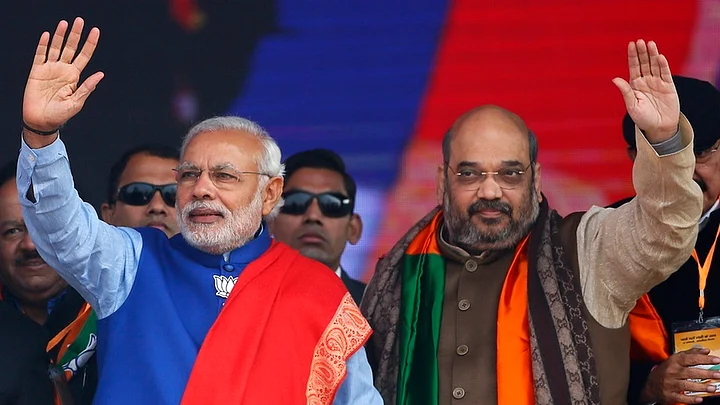Kashmir is ablaze and relations with Pakistan are at a low. Consequently, the communal cauldron is on a slow simmer. The gas can always be turned on for it to bubble over. All of this is not without purpose.
Elections to the Uttar Pradesh, Punjab and Goa assemblies are due in February 2017, six months from now. The Narendra Modi government will have completed half its term.
If hard saffron is to be the chosen line in these elections, softness with Pakistan hardly serves a purpose. “Development” as a platform will be required in 2019 General Elections. What shade of saffron is to be mixed with development will be improvised in the light of experience after the February state elections.
The Atal Bihari Vajpayee-led government faced similar choices in July 2001. Uttar Pradesh elections then, as now, were due in February, six months away.
Today, of course, the Modi-Amit Shah duo will settle on a hard line for the coming state elections. But in July 2001, there were two views in the BJP on the platform for the UP elections. Vajpayee and then External Affairs Minister Jaswant Singh were on the same page — a softer line, approximating to the middle ground which would open the door to a wider electorate.
Luck Favoured the Hardliners
This was one of the reasons they were so enthusiastic about the Agra Summit with President Pervez Musharraf in July 2001. This was anathema to leaders like LK Advani. Helped decisively by senior Ministry of External Affairs officials, the summit was wrecked.
A hard line for the UP elections became a fait accompli.
Luck favoured the hardliners. Within six weeks of Agra, 9/11 happened. By 7 October, 2001, President George Bush had embarked on the world’s most riveting fireworks on live TV — air strikes on Afghanistan. The global war on terror metastasised into global war on Muslim terror. Anti-Muslim rhetoric soared. Journalist Geraldo Rivera whipped out a revolver live on Fox News. He would shoot Osama bin Laden if he ever saw him. New standards in journalism were being set.
An irony confronted New Delhi. Since 1989, successive Indian Prime Ministers had complained of “cross border terrorism from Pakistan”. Suddenly Islamabad was Washington’s key partner in the war on global terror.
Bush’s Ambassador in New Delhi, Robert Blackwill, explained the incongruity in simple words:
Pakistan is helping the US fight the global war on terror; the cross-border terrorism New Delhi complains of is part of an old regional quarrel.
Gujarat is More Prone to Communalism Than UP
Only after the 13 December 2001 attack on Indian Parliament and the unprecedented mobilisation of the armies on both sides of the border, did the Indian complaint register with the international community. Nevertheless, it remained a piquant situation. America’s frontline partner in the War on Terror was also New Delhi’s principal tormentor with its relentless cross-border terrorism. Not for the first time, the US was sailing on two boats at the same time.
BJP hardliners, in search for electoral gain, ended up with something of a mixed bag. Shrill anti-Pak rhetoric and anti-Muslim atmospherics worldwide because of the global war on terror did not work in UP. Election results came out on 24-25 February, 2002. Rajnath Singh, as Chief Minister, had brought down the BJP’s tally from 174 to 88 seats in a House of 403.
However, Modi’s hard saffron campaign in Gujarat in July 2001, boosted by the post-Godhra pogrom, succeeded. He won 127 seats in a House of 182. Clearly, compared to UP, Gujarat is more communalism-prone. Witness the 1969 Gujarat riots in which, according to a commission of inquiry, 527 Muslims perished. Hitendra Desai of the Congress was the Chief Minister.
Also, the Modi campaign had the tailwind rising from the Gujarat pogrom of February 2002. Rajnath Singh’s UP campaign predated the riots. Amit Shah must have pondered this deeply when he crafted the 2014 Parliament elections particularly in UP. Deep saffron in the air does not by itself suffice for electoral delivery. Riots too are sometimes required.
So, Amit Shah raised the communal pitch in UP to the levels of post-Godhra Gujarat. The Muzaffarnagar riots of August-September 2013 served this purpose. Amit Shah came up trumps. BJP won 73 of the 80 seats in UP.
The BJP-PDP Three-Legged Race Will Continue
It is only reasonable to assume that the party will maintain communal temperatures from tepid to torrid until the elections in February. Steps towards harmony in the Kashmir valley or on the India-Pakistan track will unsettle the political thermostat programmed towards these electoral ends.
If this is the unstated script, the BJP-PDP three-legged race will continue. In the meantime Ram Madhav, BJP’s agile point man for Kashmir, will keep whispering soothing mantras in the PDP’s ears. The BJP-PDP alliance will ride the tiger until it devours them.
Whenever the valley flares up, a grand delusion afflicts pundits in New Delhi, that Kashmir can be sorted out by talking to “all sides” in the state. There is an aversion to look at the complex triangular reality. In 1947-48 we trapped ourselves in a triangle. New Delhi-Srinagar, India-Pakistan, Hindu-Muslim are one complex of issues. You cannot touch one line of this triangle without affecting the other two. This formula is cast in stone.
Vajpayee had the stature nationally, and in the Sangh Parivar, to take a holistic view of this triangle. Prime Minister Manmohan Singh picked up the thread until he ran into Pakistani recalcitrance. He and some of his Pakistani interlocutors knew that agreement is possible without any territorial bargain provided the triangle is kept in focus.
(A senior commentator on political and diplomatic affairs, Saeed Naqvi can be reached on saeednaqvi@hotmail.com. The views expressed are personal.)
(At The Quint, we question everything. Play an active role in shaping our journalism by becoming a member today.)
